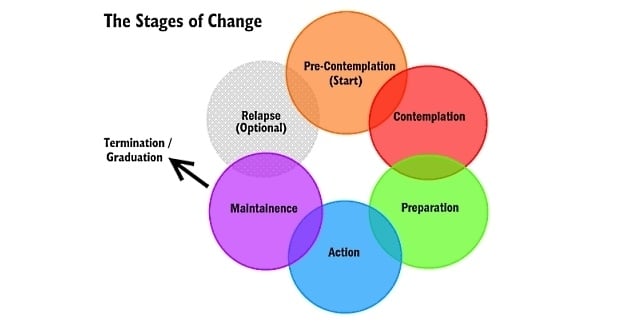Motivation For Self-Change
Pete Soderman, SMART Recovery Facilitator
 Three-quarters of us who have abused or were dependent upon a substance or activity have either self-remitted or moderated to non-abusive levels, either completely on our own, or with minimal help. That we have done so without formal treatment or self-help programs has been well-established by the scientific community in many detailed studies over several decades. In fact, at least 34 studies have indicated that the single most effective treatment method for dependence is a single brief intervention from a trusted health-care provider, such as a family doctor.
Three-quarters of us who have abused or were dependent upon a substance or activity have either self-remitted or moderated to non-abusive levels, either completely on our own, or with minimal help. That we have done so without formal treatment or self-help programs has been well-established by the scientific community in many detailed studies over several decades. In fact, at least 34 studies have indicated that the single most effective treatment method for dependence is a single brief intervention from a trusted health-care provider, such as a family doctor.
In 1999, I was sitting on a hospital bed, waiting to be released, merely five days after a major heart attack, wondering how to convince my wife to stop on the way home for a carton of cigarettes. Before my cardiologist signed the release, she looked me right in the eyes and told me that if I started smoking again, my chances of dying, and doing it quickly, were four times greater than if I didn’t. If that wasn’t enough, my wife told me on the way home that she would leave me, should I ever smoke again, because she couldn’t stay around to watch me die. I have never smoked again!
My doctor and my wife brought me to the point where the costs of continuing to engage in the activity of smoking no longer outweighed the benefits of using the substance. I was suddenly willing to do whatever it took to quit. Sure, I had cravings and urges, but I knew they wouldn’t last long, and I knew I could withstand them, as I was well-motivated.
Studies show that everyone who successfully overcomes a dependency problem does so after reaching the same cognitive decision that I did – the cost of engaging in the activity outweighs the benefits. The professionals call this decision, and it is a decision, the crystallization of discontent, and it provides the primary motivation for the self-change process that all remitters go through, whether they do it with or without help. Most who reach this decision on their own never show up in treatment centers or self-help groups, but there are those that do, and when they do, it’s most important that their decision be reinforced and augmented, as they are in either the Preparation or Action stages-of-change.

(Click here for an explanation of the stages-of-change).
Others, who are still in the Pre-contemplative, or Contemplative stage, and have not as yet reached the crystallization of discontent, are in the greatest need of the tools SMART Recovery® offers. Referring back to studies again, the second most-effective treatment method is Motivational Enhancement, which includes tools such as an assessment of substance use, substance-related problems, level of dependence, level of motivation, and a complete cost vs. benefit evaluation. These are exactly the motivational tools we offer at SMART, and we use them not only to reinforce the decision already made by those who want to make a change, but also to help bring those who have not yet made the decision but are considering it, to the same point.
Reaching the point of crystallization of discontent with my alcohol use was a lengthier and more painful process, as it was the cumulative result of several incidents occurring over many months, culminating in a very emotional scene with my young daughter in the summer of 1990. Prior to that scene, I was very much in the Pre-contemplative stage. I didn’t question my own alcohol use because I truly believed the problems I was having, and the intense pain I was suffering as a result, were due to my job, my wife, my kids, anything not having to do with myself, or the alcohol I was drinking. The experience with my daughter opened me to the possibility that my drinking was the cause of my problems, and moved me into the Contemplative stage, which for me, lasted only a few hours, as my last drink was the next day. I was lucky, not everyone has the benefit of an intense emotional experience to help them make the decision to stop. Many linger, some undergoing additional years of suffering and pain.
If you are concerned that you may be experiencing dependence upon a substance or activity that is causing a problem in your life, I suggest you take advantage of the resources on the SMART Recovery® website, especially the Cost Benefit Analysis (CBA), (see here for an overview and instructions), and the confidential survey at Drinker’s Checkup, as they are tools that can help you reach the decision that the costs of whatever it is that’s causing the problem outweigh any benefits you may be receiving from it, especially in the long term. If you are honest with the CBA, you should see that there are simply NO long-term benefits of continuing the behavior, the benefits, if any are short-term only, and there are no long term costs for not continuing the behavior. That, my friend, constitutes the crystallization of discontent.
“The forgoing is an excerpt from the book “Powerless No Longer” by Pete Soderman, and is the property of the author.”
About The Author: Pete Soderman is a Smart Facilitator who co-founded the SMART meeting in Wilmington, NC with Mike Werner, and is currently facilitating a SMART meeting in Ajijic, Jalisco Mexico.
